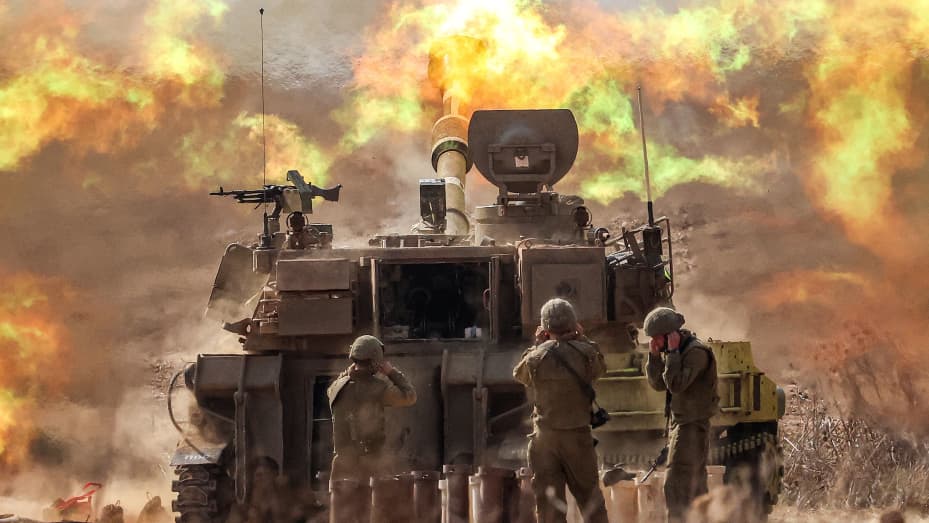Israel Army Chief Pledges Iran Response, Bracing For The Worst As Western Countries Urge Restraint
The head of Israel's military has affirmed the nation's preparedness to respond to Iran's recent assault, while western countries are urging restraint to prevent an escalation of tensions in the Middle East.

The leader of Israel’s military has affirmed the nation’s readiness to react to Iran’s recent assault, while several Western nations are urging Israel to refrain from escalating tensions in the Middle East.
Prime Minister Benjamin Netanyahu convened his war council for the second time in less than a day on Monday in response to Iran’s missile and drone strike.
Israel’s military Chief of Staff, Herzi Halevi, stated that Israel would retaliate but refrained from giving specifics.
Halevi emphasized, “This barrage of numerous missiles, cruise missiles, and drones into Israeli territory will not go unanswered,” speaking at the Nevatim Airbase in southern Israel.
Iran’s attack, a response to an Israeli strike on its embassy compound in Damascus earlier this month, has heightened concerns of a direct confrontation between Israel and Iran, amplifying worries that the violence stemming from Israel’s conflict with Gaza may spread further in the region.
“We’re teetering on the brink, and it’s imperative that we step back,” remarked Josep Borrell, the European Union’s High Representative for Foreign Affairs and Security Policy, in an interview with Spanish radio station Onda Cero. “We must apply the brakes and reverse course.”
French President Emmanuel Macron, German Chancellor Olaf Scholz, and United Kingdom Foreign Secretary David Cameron echoed similar sentiments, aligning with calls for restraint from Washington and United Nations Secretary-General Antonio Guterres.

“Neither the region nor the world can withstand further warfare,” asserted Guterres on Sunday. “The time is now to de-escalate and defuse tensions.”
Russia refrained from publicly criticizing its ally Iran for the strikes but expressed concerns about the potential for escalation on Monday, advocating for restraint.
“Escalation serves no one’s interests,” emphasized Kremlin spokesman Dmitry Peskov.
Belgium and Germany summoned Iranian ambassadors over the attack, in which Iran launched numerous drones and missiles, most of which were intercepted by Israel’s Iron Dome defense system with assistance from the US, UK, France, and Jordan.
The attack was retaliation for an Israeli airstrike on the Iranian consulate in Damascus on April 1, which resulted in the deaths of seven members of the Islamic Revolutionary Guard Corps, including two generals.
Concerns about an escalation of conflict in the region have intensified following Tehran’s retaliatory strike on Israel.
US President Joe Biden assured Netanyahu that Washington would not participate in any potential Israeli retaliation against Iran.
Since the beginning of Israel’s military operations in Gaza in October, clashes have erupted between Israel and Iran-backed groups across Lebanon, Syria, Yemen, and Iraq.
Israel’s stated objective is to dismantle Hamas, the Palestinian group responsible for an attack on October 7, which resulted in the deaths of at least 1,139 people, primarily civilians, according to estimates based on Israeli data. Additionally, around 250 individuals were taken captive.
According to Palestinian authorities, over 33,500 individuals, predominantly women and children, have died in the Israeli offensive on Gaza.
Large portions of the territory have been destroyed, raising concerns from aid agencies about an impending famine due to severe Israeli restrictions on food and humanitarian aid supplies.

The Viewpoint
The escalation of the conflict between Iran and Israel holds significant implications for the world at large.
Regional Destabilization – First and foremost an escalation in tensions between Iran and Israel could further destabilize an already volatile region.
It may also potentially aggravate conflicts in neighboring countries like Syria, Lebanon, Yemen, and Iraq, where both Iran and Israel have influence and proxies.
Global Energy Markets – Secondly, Any escalation could disrupt global energy markets, particularly if it impacts oil-producing regions in the Middle East.
As has already been witnessed, concerns over supply disruptions are leading to increased oil prices, which are affecting economies worldwide.
Humanitarian Crisis – A prolonged conflict could further worsen the humanitarian situation, especially for civilians in conflict zones like Gaza and Syria, which are witnessing a severe crisis in terms of food supplies, clean water and medical supplies.
Increased violence may lead to more casualties, displacement, and strain on humanitarian resources.
Geopolitical Alliances – Escalation could strain diplomatic relations and alliances globally. Countries may find themselves pressured to take sides, leading to further polarization in international politics.
Nuclear Proliferation Concerns – Given Iran’s nuclear program and Israel’s stance on preventing Iran from obtaining nuclear weapons, escalation raises concerns about the potential for a nuclear confrontation or the spread of nuclear weapons in the region.
Impact on Peace Efforts – Escalation could derail ongoing peace efforts and diplomatic initiatives in the region, making it harder to achieve lasting stability and peace agreements between Israel and its neighbours.
Economic Impact – The uncertainty and instability resulting from an escalation could negatively impact global markets and investor confidence, affecting trade, investment, and economic growth worldwide.
The Last Bit, a further escalation of the Iran-Israel conflict would have far-reaching consequences, impacting not only the immediate region but also global politics, security, and economy.
The importance of diplomatic efforts to de-escalate tensions and find peaceful resolutions to conflicts in the Middle East has never been as needed as it is in the current circumstance!




